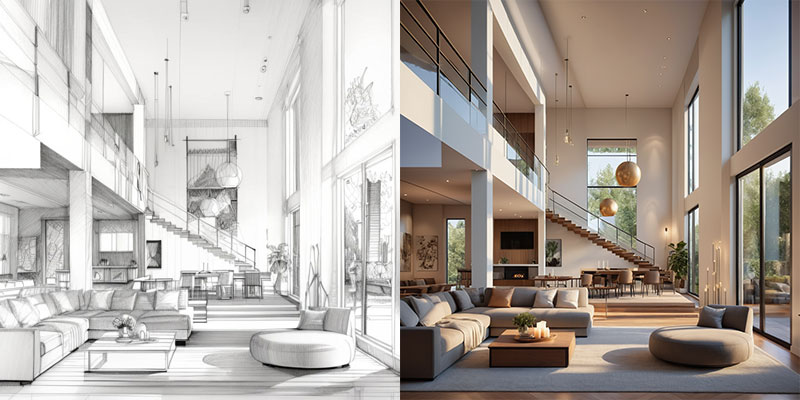दोस्तों को आमंत्रित करें और दोनों के लिए मुफ्त सिक्के प्राप्त करें
yvonne liao
स्केच रेंडरिंग
v3
This photo shows a traditional Japanese-style Japanese room space, full of Zen and natural beauty, and showing the essence of Japanese architectural design.
The main part of the room is a Japanese style room, with traditional tatami mats laid on the right side of the floor, emphasizing natural materials and simple style.
The floor-to-ceiling window on the right side faces a tranquil natural scenery, with stacked mountains and mist in the distance, seeming to connect the indoor and outdoor spaces, achieving a design effect of "borrowed scenery".
The wooden terrace is seamlessly connected with the indoor tatami, making people feel close to nature while maintaining the comfort of home.
A simple low wooden table is placed indoors, with tea sets placed on the table, reflecting the restrained beauty of Japanese tea ceremony culture.
Mats are placed randomly on the tatami, making it easy for people to sit on the floor, echoing the traditional use of Japanese-style rooms.
The surrounding area is composed of wooden frames and paper sliding doors (shoji), which reveal soft natural light and create a peaceful and warm atmosphere.
The kitchen cabinets are designed in black with embedded bamboo details to add a natural touch.
There is an ebony island bar with four high chairs placed on the sides, which is simple yet textured.
Shows a warm and comfortable cooking environment under soft lighting.
An ebony dining table is placed in the center, paired with chairs with light milk tea cushions. The chair backs incorporate bamboo elements, echoing the Zen and practicality of Japanese-style space.
There are tea sets on the table, implying the cultural atmosphere of tea tasting and meditation.
The indoor lamps are slender standing lamps with lampshades made of paper or fabric, which emit soft and warm light. With the natural light source penetrated by the shoji, the overall atmosphere is more harmonious.
Recessed lighting inside the ceiling adds depth to the space.
In the photo, dark wood is used as the base tone, paired with the light color of the tatami, forming a calm and soft contrast.
The space is clean and minimalist, with few unnecessary decorations, emphasizing symbiosis with nature and a Zen lifestyle.
Overall, this is a space full of traditional Japanese aesthetics that not only maintains practicality, but also allows people to feel calm, relaxed and connected to nature.
मोड:
प्रेसिजन कॉन्सेप्ट
रचनात्मकता:
56
0
रीमिक्स
अभी तक कोई डेटा नहीं है

0
पसंदरिपोर्ट
yvonne liao
स्केच रेंडरिंग
v3
This photo shows a traditional Japanese-style Japanese room space, full of Zen and natural beauty, and showing the essence of Japanese architectural design.
The main part of the room is a Japanese style room, with traditional tatami mats laid on the right side of the floor, emphasizing natural materials and simple style.
The floor-to-ceiling window on the right side faces a tranquil natural scenery, with stacked mountains and mist in the distance, seeming to connect the indoor and outdoor spaces, achieving a design effect of "borrowed scenery".
The wooden terrace is seamlessly connected with the indoor tatami, making people feel close to nature while maintaining the comfort of home.
A simple low wooden table is placed indoors, with tea sets placed on the table, reflecting the restrained beauty of Japanese tea ceremony culture.
Mats are placed randomly on the tatami, making it easy for people to sit on the floor, echoing the traditional use of Japanese-style rooms.
The surrounding area is composed of wooden frames and paper sliding doors (shoji), which reveal soft natural light and create a peaceful and warm atmosphere.
The kitchen cabinets are designed in black with embedded bamboo details to add a natural touch.
There is an ebony island bar with four high chairs placed on the sides, which is simple yet textured.
Shows a warm and comfortable cooking environment under soft lighting.
An ebony dining table is placed in the center, paired with chairs with light milk tea cushions. The chair backs incorporate bamboo elements, echoing the Zen and practicality of Japanese-style space.
There are tea sets on the table, implying the cultural atmosphere of tea tasting and meditation.
The indoor lamps are slender standing lamps with lampshades made of paper or fabric, which emit soft and warm light. With the natural light source penetrated by the shoji, the overall atmosphere is more harmonious.
Recessed lighting inside the ceiling adds depth to the space.
In the photo, dark wood is used as the base tone, paired with the light color of the tatami, forming a calm and soft contrast.
The space is clean and minimalist, with few unnecessary decorations, emphasizing symbiosis with nature and a Zen lifestyle.
Overall, this is a space full of traditional Japanese aesthetics that not only maintains practicality, but also allows people to feel calm, relaxed and connected to nature.
मोड:
प्रेसिजन कॉन्सेप्ट
रचनात्मकता:
56
0
रीमिक्स
अभी तक कोई डेटा नहीं है



























